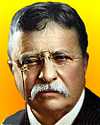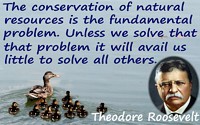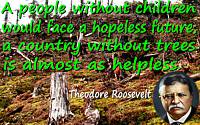 (source)
(source)
|
Theodore Roosevelt
(27 Oct 1858 - 6 Jan 1919)
American president and conservationist (26th, 1901-09) whose term included efforts to conserve national resources, especially the passage of the Newlands Reclamation Act (1902). He was the first president to ride in an automobile (1902), go underwater in a submarine (1905), or fly in an airplane (1910). Immediately after leaving his presidency, he undertook a safari to Africa as hunter and naturalist. In 1913, he travelled on a scientific expedition to the interior of Brazil which produced geographic, geological, and zoological information, and almost two thousand specimens of birds and mammals were collected for the American Museum of Natural Science.
|

Roosevelt—The Friend of Man
By ROBERT E. PEARY
Rear Admiral, United States Navy, Retired; President, Aerial League of America;
Chairman, National Aerial Coast Patrol Commission
from Natural History (1919)
A SORROWING nation pays meet tribute to the passing of the greatest American of his time—Theodore Roosevelt.
The one outstanding feature of the complex character of Roosevelt, the man of many parts, was his friendship for man in the abstract—and when this friendship took concrete form for the individual, it became, for its recipient, a tower of strength as fortifying and as impregnable as Gibraltar.
The friendship of Theodore Roosevelt was indeed a most precious possession. Whenever and wherever extended, it had the effect of a superlative superincentive to greater deeds—a step by step advancement, onward and upward, never permitting a retrogression.
I make the following statement without fear of successful contradiction, that no other single personality in this great world of ours today has gathered from such a multitude, from all quarters, kinds, and conditions of life, the utmost in spontaneous affection that has been accorded him during his years of contact with a world’s people.
Thousands upon thousands, in all parts of the world, became his friend through the magnetic personality of his written words, which have reached to the uttermost extremes of enlightened civilization all over the globe.
Inestimable tribute should be paid to Colonel Roosevelt’s memory for the advice and support, given when President of the United States, to the Peary Arctic Club Expedition to the North Polar Regions which resulted in reaching the Pole April 6, 1909.
In 1912, at the annual dinner of the Explorers’ Club, I ventured the prophecy that in a few years the polar regions would be reconnoitered and explored through the air. That prophecy is about to be consummated.
The great war has forced the development of the science of aeronautics and aircraft to that point where no portion of the globe exists today that cannot be visited and explored by either plane or dirigible. It is indeed a fitting tribute to Colonel Roosevelt’s earnest support of aeronautics at all times, that the Bartlett Arctic Expedition, promulgated and organized through the efforts of the Aero Club of America, should be known as “The Roosevelt Memorial Expedition.”
Colonel Roosevelt was a veteran supporter of aeronautics. In 1897, when he was Assistant Secretary of the Navy, he used his influence to secure the necessary appropriation needed by Professor Langley to continue his plans for aviation. Colonel Roosevelt was also responsible for giving the United States Army an aeroplane before any other nation had one. In 1907 he approved the ordering of a biplane and a dirigible.
Scientific results of inestimable value to the United States and to the whole world are directly traceable to Roosevelt’s friendship for man.
- Science Quotes by Theodore Roosevelt.
- Theodore Roosevelt - memorialized as a Naturalist in a tribute by John Burroughs in Natural History magazine (1919)
- Theodore Roosevelt, Naturalist - memorial tribute by Henry Fairfield Osborn in Natural History magazine (1919)
- Theodore Roosevelt and Africa - memorial tribute by Carl Akeley in Natural History magazine (1919)
- Personal Glimpses of Theodore Roosevelt - memorial tribute by David Starr Jordan in Natural History Magazine (1919).
- Roosevelt, the Man of Abundant Life - memorial tribute by Gifford Pinchot in Natural History magazine (1919).
- Theodore Roosevelt - context of his “A Country Without Trees” quote - Medium image (500 x 350 px).
- Theodore Roosevelt - context of his “Conservation of natural resources is the fundamental problem” quote - Medium image (500 x 350 px)
- Theodore Roosevelt - context of his “A Country Without Trees” quote - Large image (800 x 600 px).
- Theodore Roosevelt - context of his “Conservation of natural resources is the fundamental problem” quote - Large image (800 x 600 px)
- The Wilderness Warrior: Theodore Roosevelt and the Crusade for America, by Douglas Brinkley. - book suggestion.
- Booklist for Theodore Roosevelt.






